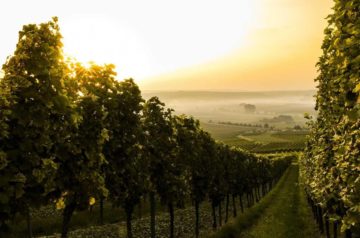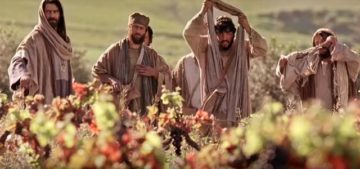The Gospel for the Twenty-seventh Sunday of Ordinary Time is our focus this St. Francis Feast. Fr. Paul Gallagher, OFM invites us in this week’s reflection to again place ourselves in the vineyard. The content is edited by Franciscan Sister of Christian Charity Sister Anne Marie Lom and Joe Thiel. The excerpts from the Sunday readings are prepared by Joe Thiel. To read or download the complete pdf with excerpts for your prayer, please click here Franciscan Gospel Reflection October 4 2020. Excerpts are from the Lectionary for Mass for Use in the Dioceses of the United States of America, second typical edition © 2001, 1998, 1997, 1986, 1970 Confraternity of Christian Doctrine, Inc., Washington, DC. Used with permission. All rights reserved. No portion of this text may be reproduced by any means without permission in writing from the copyright owner. Photo: Pinterest, Pinterest
Matthew 21:33-43
Jesus said to the chief priests and elders of the people: “Hear another parable. There was a landowner who planted a vineyard, put a hedge around it, dug a wine press in it, and built a tower. Then he leased it to tenants and went on a journey. When vintage time drew near, he sent his servants to the tenants to obtain his produce. But the tenants seized the servants and one they beat, another they killed, and a third they stoned.
Again he sent other servants, more numerous than the first ones, but they treated them in the same way. Finally, he sent his son to them, thinking, ‘They will respect my son.’ But when the tenants saw the son, they said to one another, ‘This is the heir. Come, let us kill him and acquire his inheritance.’ They seized him, threw him out of the vineyard, and killed him.
What will the owner of the vineyard do to those tenants when he comes?” They answered him, “He will put those wretched men to a wretched death and lease his vineyard to other tenants who will give him the produce at the proper times.” Jesus said to them, “Did you never read in the scriptures: ‘The stone that the builders rejected has become the cornerstone; by the Lord has this been done, and it is wonderful in our eyes’? Therefore, I say to you, the kingdom of God will be taken away from you and given to a people that will produce its fruit.
Background:
In last week’s gospel, Jesus told the parable of two sons who were asked to work in their father’s vineyard. This week Matthew presents another parable of Jesus. This parable might give the impression that the landowner has personally done the difficult work of setting up the vineyard, and that it exists as a result of his personal toil and care. Scripture scholars believe that the parable as originally told by Jesus ended here. The point was that God had created all things, and He expected each person to fulfill the responsibilities that had been bestowed on them by God.
At the same time the lived experience of the people was that very few worked on land that was their own. Most labored for landowners who lived in distant lands. Of what was produced by those who lived off the land, 35% to 40% went to social and religious taxes, and about 40% went to purchase what was necessary for maintenance, leaving about 20% for family survival. Even less was left for those who needed to share the proceeds with a foreign landowner.
The parable as told by Jesus could easily be adapted to speak to the injustices that most felt in their day. The Christian community adapted the parable to relate to their circumstances. Those who came to collect the rightful owner’s portion symbolized prophets of the old testament who point to the coming of God’s son, Jesus becomes the son who was killed, and misguided tenant farmers represented the religious leaders of the day.
The present reader might wonder where in the parable do we look to find meaning and God speaking in our present lives. If we truly believe that God is actively at work in our history and our lives, then God is working in the scriptures and the parable as it was originally told by Jesus, and He is working in people who reinterpreted that parable to speak to them of God working in their lived reality, and He is working in our lives as we hear the scripture today, with our lived reality such as it is in the fall of 2020. God speaks to us of God’s desire to be present to us, and He reminds us that our lives are to reflect God’s faithful presence for all.
Reflection Questions:
- Do you or your family have favorite stories that get told over and over?
- Are you aware of how the story changes depending on things like who is the teller, or the circumstances in which the story is being told?
- Have you ever had to ask someone to care for your house, garden, or pet? What kind of emotions were present within you as you made your request known?
- How does your life reflect the reality that God is the creator and you have been entrusted with care of God’s creation?
- Have there ever been times when you acted as if that which has been entrusted to your care belongs to you? Are there also times when your actions express your belief that God is the creator and you are God’s steward?
- Can you talk to God as the Creator and your role as steward, the gift of creation with which God has blessed you, or some other aspect of this parable that is meaningful for you?




